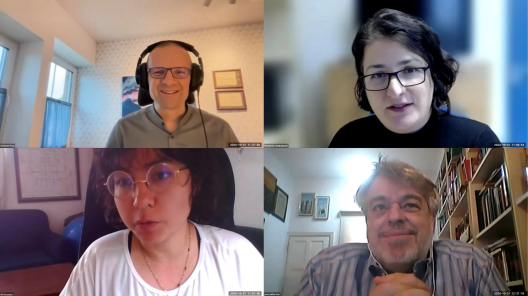“The Future of Online Participation in Smart Cities“: An Insight into the Brazil Chair event series at the University of Münster

On 16 October and 19 November, the first two online events in the series “The Future of Online Participation in Smart Cities“ took place, organised by the Brazil Chair and the Brazil Centre at the University of Münster. The online events brought together experts from academia and civil society to discuss the growing role of artificial intelligence (AI) in smart cities and its importance for democratic participation. The first two events in the five-part series “The Future of Online Participation in Smart Cities“ attracted an international audience that listened intently to the presentations and discussions on the topics of “AI and online participation: Impacts and new challenges for cities and democracy“ and “Building public infrastructures for online participation”.
In their welcoming speeches at the opening event, institutional representatives and experts such as Professor Bernd Hellingrath, Scientific Director of the Brazil Centre, and Ernesto Lembcke, representative of the International Digital Dialogue, emphasised the importance of international cooperation and the global exchange of knowledge provided by technological progress. Professor Carlos Vaz, holder of the Brazil Chair and professor at the University of São Paulo, emphasised the need to consciously use technology to strengthen democracy. Professor Norbert Kersting, visiting professor of the Brazil Chair at the Institute of Political Science at the University of Münster, spoke about the importance of bilateral exchange between Brazil and Germany, which can facilitate concrete solutions to global challenges.
I am very pleased that we have the Brazil Chair here at our faculty, with Professor Vaz, postdoctoral researcher Fernanda Campagnucci and doctoral student Italo Sousa. (...) This partnership and the bilateral exchange are extremely valuable, and they enable a genuine transfer of knowledge and joint solutions to global challenges. (Prof Dr Norbert Kersting)

Webinar #1: “AI and online participation: Impacts and new challenges for cities and democracy“
The kick-off event took place on 16 October and was moderated by Prof. Dr Norbert Kersting. The panel with an average of 30 participants was marked by an insightful discussion between Ricardo Poppi, Managing Director of Instituto Cidade Democrática, Ms Clara Iglesias Keller, Head of the Research Group ‘Technology, Power and Dominance’ at the Weizenbaum Institute, and Prof. Dr Andreas Jungherr, Professor of Political Science, in particular Digital Transformation at the University of Bamberg, on the role of artificial intelligence (AI) in online participation in smart cities. The guests discussed how AI technologies can change governance and citizen participation - including their use for more efficient data management, improved accessibility and participation as well as the innovative opportunities that AI offers. This also includes the ethical and practical challenges associated with its use - with data protection, bias and transparency at the centre of the discussion. It was also emphasised that AI technologies must be used responsibly and in accordance with democratic principles; and that AI should be seen as a tool that expands the capacities of the city administration, but does not replace human decision-making processes without reflection. The Painelists also emphasised the need for intensive and interdisciplinary research as future research and action approaches in order to comprehensively understand and manage the opportunities and risks of AI in smart cities.
It is crucial to design and regulate AI technologies in such a way that they are not only efficient, but also fair and inclusive. (Ricardo Poppi)
We need to ensure that our legal frameworks are robust enough to deal with the challenges that AI creates for democracy. (Clara Iglesia Keller)
AI is a technology that works for a very specific subset of problems (...) you need an area where there is a wealth of data to learn from. (Andreas Jungherr)

Webinar #2: “Building public infrastructures for online participation“
The second event in the series, moderated by chair holder Prof Dr José Carlos Vaz, took place as part of Innovation Week 2024 at Enap (National School of Public Administration) in Brazil and was simultaneously translated from English into Portuguese, attracting many Brazilian participants. Panellists Alejandra Gonzales, Director of Growth and Community Relations at Codeando México, and Prof. Dr Christian Kray, Head of the Situated Computing Lab (sitcom Lab), at the Institute of Geoinformatics at the University of Münster, discussed the important role of digital public infrastructures for the development of democratic and participatory smart cities and their potential for improved citizen services and participation. The discussion also led to the conclusion that both technological solutions and broad educational efforts (such as educational programmes that inform citizens about their rights and opportunities within digital platforms) are necessary to achieve these goals. The importance of data protection and secure data processing in such systems was also emphasised. It became clear that continuous efforts and collaboration are needed to fully realise the potential.
If the software was developed with public money, then the code should also be public. (Alejandra Gonzales)
I think that digital sovereignty is a really crucial part of setting up any kind of participatory environment in a smart city, because without it you can't really ensure that the interests of all participants are taken into account equally. (Prof Dr Christian Kray)
This online event series is an important part of the Scope research project, which is led by Prof José Carlos Vaz (EACH/USP) and postdoctoral researcher Fernanda Campagnucci and is based at the Institute of Political Science under Prof Dr Norbert Kersting. It is supported by CAPES, the Brazil Centre of the University of Münster, and institutional partners such as the Federal Ministry for Digital and Transport Affairs and the Goethe-Institut São Paulo.
Don't miss the opportunity to take part in these important discussions. Your ideas could be essential to how we understand and shape our urban environment.
Stay up to date and be part of the future of Smart Cities. Visit our website or subscribe to our YouTube channel to make sure you don't miss anything!
Guest chair „Brazil Chair“ is occupied by two top researchers

